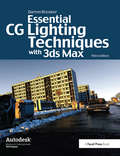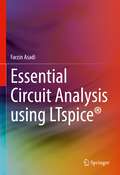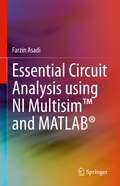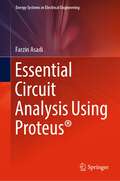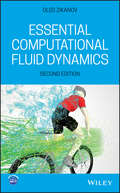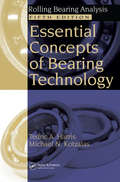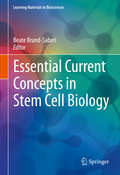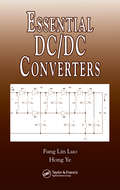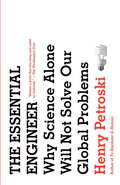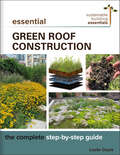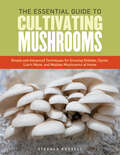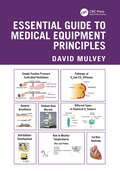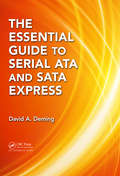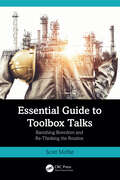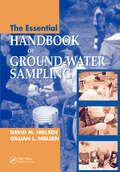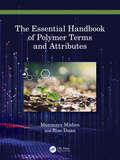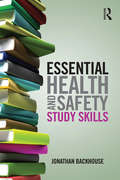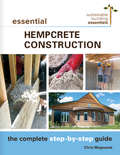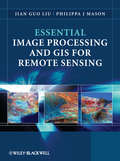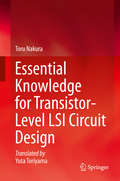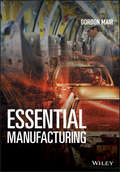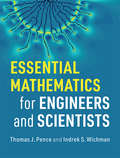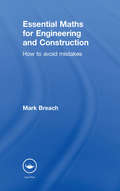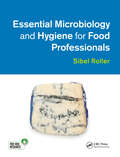- Table View
- List View
Essential CG Lighting Techniques with 3ds Max
by Darren BrookerCertified by Autodesk, Darren Brooker's new edition teaches the production techniques behind real-world work. The tutorials take you from the fundamentals of lighting, right through to advanced techniques.
Essential Circuit Analysis using LTspice®
by Farzin AsadiThis textbook provides a compact but comprehensive treatment that guides students through the analysis of circuits, using LTspice®. Ideal as a hands-on source for courses in Circuits, Electronics, Digital Logic and Power Electronics this text focuses on solving problems using market-standard software, corresponding to all key concepts covered in the classroom. The author uses his extensive classroom experience to guide students toward deeper understanding of key concepts, while they gain facility with software they will need to master for later studies and practical use in their engineering careers.
Essential Circuit Analysis using NI Multisim™ and MATLAB®
by Farzin AsadiThis textbook provides a compact but comprehensive treatment that guides students through the analysis of circuits, using NI Multisim™ and MATLAB®. Ideal as a hands-on source for courses in Circuits, Electronics, Digital Logic and Power Electronics this text focuses on solving problems using market-standard software, corresponding to all key concepts covered in the classroom. The author uses his extensive classroom experience to guide students toward deeper understanding of key concepts, while they gain facility with software they will need to master for later studies and practical use in their engineering careers.
Essential Circuit Analysis Using Proteus® (Energy Systems in Electrical Engineering)
by Farzin AsadiThis textbook provides a compact but comprehensive treatment that guides students through the analysis of circuits, using Proteus®. The book focuses on solving problems using updated market-standard software, corresponding to all key concepts covered in the classroom. The author uses his extensive classroom experience to guide students toward a deeper understanding of key concepts while they gain facility with the software they will need to master for later studies and practical use in their engineering careers. The book includes detailed exercises and examples that provide better grasping to students. This book will be ideal as a hands-on source for courses in computer-aided circuit simulation, circuits, electronics, digital logic, and power electronics. Though written primarily for undergraduate and graduate students, the text will also be useful to Ph.D. scholars and practitioners in engineering who are working on Proteus.
Essential Classical Thermodynamics (SpringerBriefs in Physics)
by Ulf W. GeddeThis book is a concise, readable, yet authoritative primer of basic classic thermodynamics. Many students have difficulty with thermodynamics, and find at some stage of their careers in academia or industry that they have forgotten what they learned, or never really understood these fundamental physical laws. As the title of the book suggests, the author has distilled the subject down to its essentials, using many simple and clear illustrations, instructive examples, and key equations and simple derivations to elucidate concepts. Based on many years of teaching experience at the undergraduate and graduate levels, “Essential Classical Thermodynamics” is intended to provide a positive learning experience, and to empower the reader to explore the many possibilities for applying thermodynamics in other fields of science, engineering, and even economics where energy plays a central role. Thermodynamics is fun when you understand it!
Essential Computational Fluid Dynamics
by Oleg ZikanovProvides a clear, concise, and self-contained introduction to Computational Fluid Dynamics (CFD) This comprehensively updated new edition covers the fundamental concepts and main methods of modern Computational Fluid Dynamics (CFD). With expert guidance and a wealth of useful techniques, the book offers a clear, concise, and accessible account of the essentials needed to perform and interpret a CFD analysis. The new edition adds a plethora of new information on such topics as the techniques of interpolation, finite volume discretization on unstructured grids, projection methods, and RANS turbulence modeling. The book has been thoroughly edited to improve clarity and to reflect the recent changes in the practice of CFD. It also features a large number of new end-of-chapter problems. All the attractive features that have contributed to the success of the first edition are retained by this version. The book remains an indispensable guide, which: Introduces CFD to students and working professionals in the areas of practical applications, such as mechanical, civil, chemical, biomedical, or environmental engineering Focuses on the needs of someone who wants to apply existing CFD software and understand how it works, rather than develop new codes Covers all the essential topics, from the basics of discretization to turbulence modeling and uncertainty analysis Discusses complex issues using simple worked examples and reinforces learning with problems Is accompanied by a website hosting lecture presentations and a solution manual Essential Computational Fluid Dynamics, Second Edition is an ideal textbook for senior undergraduate and graduate students taking their first course on CFD. It is also a useful reference for engineers and scientists working with CFD applications.
Essential Concepts of Bearing Technology
by Tedric A. Harris Michael N. KotzalasFor the last four decades, Tedric Harris' Rolling Bearing Analysis has been the "bible" for engineers involved in rolling bearing technology. Why do so many students and practicing engineers rely on this book? The answer is simple: because of its complete coverage from low- to high-speed applications and full derivations of the underlying mathemati
Essential Current Concepts in Stem Cell Biology (Learning Materials in Biosciences)
by Beate Brand-SaberiThis textbook describes the biology of different adult stem cell types and outlines the current level of knowledge in the field. It clearly explains the basics of hematopoietic, mesenchymal and cord blood stem cells and also covers induced pluripotent stem cells. Further, it includes a chapter on ethical aspects of human stem cell research, which promotes critical thinking and responsible handling of the material.Based on the international masters program Molecular and Developmental Stem Cell Biology taught at Ruhr-University Bochum and Tongji University Shanghai, the book is a valuable source for postdocs and researchers working with stems cells and also offers essential insights for physicians and dentists wishing to expand their knowledge.This textbook is a valuable complement to Concepts and Applications of Stem Cell Biology, also published in the Learning Materials in Biosciences textbook series.
Essential DC/DC Converters
by Fang Lin Luo Hong YeThere are several families of DC/DC converters comprising hundreds of different topologies. Sorting through the various properties and characteristics is obviously a daunting task. Culled from the pages of the groundbreaking Advanced DC/DC Converters, this book provides a focused, concise overview of more than 80 topologies, developed by the authors, of essential DC/DC converters. The authors begin with an introduction to the basics of DC/DC conversion technology, then present an in-depth analysis of voltage-lift and super-lift converters. This book also includes a brand new chapter on the revolutionary ultra-lift Luo-converter. Several experimental and simulation results clearly illustrate the concepts.
The Essential Engineer: Why Science Alone Will Not Solve Our Global Problems
by Henry PetroskiFrom the acclaimed author of The Pencil and To Engineer Is Human, The Essential Engineer is an eye-opening exploration of the ways in which science and engineering must work together to address our world&’s most pressing issues, from dealing with climate change and the prevention of natural disasters to the development of efficient automobiles and the search for renewable energy sources. While the scientist may identify problems, it falls to the engineer to solve them. It is the inherent practicality of engineering, which takes into account structural, economic, environmental, and other factors that science often does not consider, that makes engineering vital to answering our most urgent concerns.Henry Petroski takes us inside the research, development, and debates surrounding the most critical challenges of our time, exploring the feasibility of biofuels, the progress of battery-operated cars, and the question of nuclear power. He gives us an in-depth investigation of the various options for renewable energy—among them solar, wind, tidal, and ethanol—explaining the benefits and risks of each. Will windmills soon populate our landscape the way they did in previous centuries? Will synthetic trees, said to be more efficient at absorbing harmful carbon dioxide than real trees, soon dot our prairies? Will we construct a &“sunshade&” in outer space to protect ourselves from dangerous rays? In many cases, the technology already exists. What&’s needed is not so much invention as engineering.Just as the great achievements of centuries past—the steamship, the airplane, the moon landing—once seemed beyond reach, the solutions to the twenty-first century&’s problems await only a similar coordination of science and engineering. Eloquently reasoned and written, The Essential Engineer identifies and illuminates these problems—and, above all, sets out a course for putting ideas into action.
Essential Green Roof Construction: The Complete Step-by-Step Guide (Sustainable Building Essentials)
by Leslie DoyleFor the do it yourself builder, an “essential guide . . . to install and maintain a beautiful and ecological compliment to your home or office” (Kelly Hart, author of Essential Earthbag Construction).Essential Green Roof Construction is a comprehensive, in-depth guide to building simple green roofs for houses and small buildings.Packed with detailed photos, illustrations, case studies, and code compliance advice, it offers clear step-by-step instructions necessary to create your own living roof on a new build or as a retrofit. This book includes:The benefits of a green roofThe basics of planning and designAssessing site conditions such as aspect, slope, and loadsNavigating building codes and working with building officialsMaterial options, including professional grade and economical or local alternativesPlanting suggestions for different roof climates and conditions, including food productionWhen to call on professionals to ensure safety and integrityStep-by-step guidance for safe roof installation and detailingAnnual green roof maintenance.Where common sense meets beauty—a green roof is a system of layers that work together to support plant life, insulate homes, and make the world a greener place.Essential Green Roof Construction will give you the knowledge and confidence to install your own green roof.“Impressive . . . and, importantly, easy for the average person to understand.” —Stephen Hill, associate professor, School of the Environment, Trent University“Well-written, well-researched, and full of clear and informative drawings and photos.” —Lloyd Kahn, editor-in-chief, Shelter Publications, author, Shelter and The Half-Acre Homestead“An excellent resource for both DIY and design professionals.” —Tim Krahn, P. Eng. Building Alternatives Inc., author, Essential Rammed Earth Construction
The Essential Guide to Cultivating Mushrooms: Simple and Advanced Techniques for Growing Shiitake, Oyster, Lion's Mane, and Maitake Mushrooms at Home
by Stephen RussellFrom the basics of using mushroom kits to working with grain spawn, liquid cultures, and fruiting chambers, Stephen Russell covers everything you need to know to produce mouthwatering shiitakes, oysters, lion’s manes, maitakes, and portobellos. Whether you’re interested in growing them for your own kitchen or to sell at a local market, you’ll soon be harvesting a delicious and abundant crop of mushrooms.
Essential Guide to Medical Equipment Principles
by David MulveyThis book addresses the needs of new clinical engineers, junior nurses, medics and operating department practitioners (ODPs) with regard to the fundamentals of many of the standard medical devices they will encounter in a hospital environment. The book can be used for both self-directed learning and also in a classroom environment as a textbook.Essential Guide to Medical Equipment Principles introduces and provides the principles behind many of the common medical devices and equipment used within a modern hospital. Each of the seven chapters is designed to cover a particular type of medical device such as mechanical ventilators along with the physiology that must be understood in order to make sense of their application and engineering concepts. This fundamental knowledge will enable the reader to progress further in the years to come. The author uses diagrams throughout the book to allow the reader to get the most from the text and ensure that the most essential information is understood. It offers a comprehensive understanding of the physiological and engineering principles underlying medical equipment.This book is intended for new technicians and engineers entering the clinical engineering field but can also be a valuable resource for a broader range of healthcare professionals, including operating department practitioners, neonatal unit practitioners, intensive care unit practitioners and other medical equipment users. With suppliers, manufacturers and in-hospital training, it will enable them to become safe and competent in the use and application of medical devices and equipment.
The Essential Guide to Serial ATA and SATA Express
by David A. DemingUsed in laptop and desktop computers, low-end servers, and mobile devices, Serial ATA (Advance Technology Attachment), or SATA, is the pervasive disk storage technology in use today. SATA has also penetrated the enterprise computing environment by adding hardware components for fail-over, extending command processing capabilities, and increasing de
Essential Guide to Toolbox Talks: Banishing Boredom and Re-Thinking the Routine
by Scott MoffatA Toolbox Talk (TBT) is a pre- job task made to ensure all parties involved in a task have full understanding of what they should do. TBTs are not easy; however, the author hopes this book will provide the right guidance to make TBTs less daunting, and easier to use. They are not a tick- the- box exercise; therefore, please do not treat them as such. This book challenges this perception and puts forth a case to consider TBTs essential to delivering safe working environments, thereby providing a complete understanding of the task. Essential Guide to Toolbox Talks focuses on improving three Non- Technical Skills (NTS) related to TBTs: Communication, Situation Awareness and Stress Management. With communication the book looks at the impact of inappropriate questions, allowing time for questions/ feedback, use of familiarities and knowing the answer and the errors that can occur. For situation awareness, the author conveys that effective communication enhances the environment in which people work, checking that the group understands the tasks; further coverage of what to do when things go wrong underpins this. Finally, it covers stress management and how important it is to confirm people know what to look for during a TBT and what to do if they believe a team member is under stress. With the onus on these three vital NTS, the reader will be able to deliver focused and much- improved TBTs that guarantee safe and effective performances in the workplace. This neat and punchy book will change that tick- the- box perspective of the TBT. It will appeal to both practitioners in Human Factors and anyone at the front line in high- risk industries where TBTs are a requirement, especially those in oil and gas, nuclear, construction, logistics, transport and aviation who will be certain to consider it an essential guide.
The Essential Handbook of Ground-Water Sampling
by David M. Nielsen Gillian NielsenTremendous improvements in ground-water sampling methodologies and analytical technologies have made it possible to collect and analyze truly representative samples to detect increasingly lower levels of contaminants-now in the sub-parts-per-billion range. Though these new methods produce more accurate and precise data and are less expensive, many
The Essential Handbook of Polymer Terms and Attributes
by Biao Duan Munmaya K MishraThe Essential Handbook of Polymer Terms and Attributes not only acts as an encyclopaedia of polymer science but also fosters an appreciation for the significance of polymers in fields including materials science, chemistry, engineering, and medicine. This book serves as an excellent reference book, covering every possible term and attribution associated with the vast and diverse field of polymers. This comprehensive volume serves as a vital resource for researchers working in industry and academia, offering a clear and concise exploration of polymer science with the most essential reference data available. Each polymer term is defined in a straightforward manner, ensuring that readers of all levels can grasp the concepts. The book goes beyond mere definitions, providing context and insights into the applications, properties, and synthesis. Bringing polymer terms and attributes together in one place, the book provides a broad knowledge of polymer science and facilitates idea generation for researchers and students embarking on projects related to a specific field of polymer science. Key features: This book covers all possible terms associated with the field of “polymers" and related areas, granting readers a comprehensive understanding of the entire spectrum of polymers. The organization of the book follows an alphabetical format, enabling quick and convenient access to specific terms. Each polymer term is clearly defined with a figure or scheme as needed, allowing readers to visualize the structures, processes, and applications involved. This book is written for science students, chemists, polymer scientists, chemical engineers, pharmaceutical scientists, biomedical scientists, biotechnologists, product formulators, materials scientists, and scientists working on polymers.
Essential Health and Safety Study Skills: A Guide For Students
by Jonathan BackhouseStudying for exams, working in teams, writing detailed yet succinct reports and importantly time management aren’t second nature to most, so this book provides clear guidance and will be an essential tool for anyone taking a health and safety course. For many students the learning experience will be a return to studying after some considerable time so this book combines practical advice with helpful exam-related information. Case studies and activities based on key health and safety topics that are covered by most Awarding Bodies Guidance on how to take both multiple-choice and written exams; with details on how to answer the action verbs, used in exams questions; including identify and outline Key principles teach how to Receive the information; Remember the information; and Recall the information for your exam
Essential Hempcrete Construction: The Complete Step-by-Step Guide
by Chris MagwoodHempcrete is a versatile, energy-efficient natural insulation material, useful for walls, roofs, and floors. Made from the inner stem of the hemp plant mixed with a lime-based binder, it is a very strong, lightweight and breathable alternative to manufactured insulations. Essential Hempcrete Construction is a fully-illustrated practical guide to this affordable, renewable method, from procurement to finishing.This indispensable manual is packed with all the information you need to determine whether hempcrete is the right choice for your project. It covers: Material specifications, testing and building code references and climate data Detail drawings for design reference Tool lists, and complete step-by-step instructions for mixing and placing hempcrete Finishing and maintenance techniques Budgeting and labor estimates Additional resourcesEssential Hempcrete Construction is part of New Society's Sustainable Building Essentials Series. Written by the world's leading sustainable builders, designers and engineers, these succinct, user-friendly handbooks are indispensable tools for any project where accurate and reliable information are key to success. Get the Essentials!Chris Magwood is a sustainable builder and designer specializing in green and natural building techniques, the co-founder and co-director of the Endeavour Centre, and the author of several books on sustainable building including Making Better Buildings, More Straw Bale Building, and Straw Bale Details.
Essential Image Processing and GIS for Remote Sensing
by Philippa Mason Jian Guo LiuEssential Image Processing and GIS for Remote Sensing is an accessible overview of the subject and successfully draws together these three key areas in a balanced and comprehensive manner. The book provides an overview of essential techniques and a selection of key case studies in a variety of application areas.Key concepts and ideas are introduced in a clear and logical manner and described through the provision of numerous relevant conceptual illustrations. Mathematical detail is kept to a minimum and only referred to where necessary for ease of understanding. Such concepts are explained through common sense terms rather than in rigorous mathematical detail when explaining image processing and GIS techniques, to enable students to grasp the essentials of a notoriously challenging subject area. The book is clearly divided into three parts, with the first part introducing essential image processing techniques for remote sensing. The second part looks at GIS and begins with an overview of the concepts, structures and mechanisms by which GIS operates. Finally the third part introduces Remote Sensing Applications. Throughout the book the relationships between GIS, Image Processing and Remote Sensing are clearly identified to ensure that students are able to apply the various techniques that have been covered appropriately. The latter chapters use numerous relevant case studies to illustrate various remote sensing, image processing and GIS applications in practice.
Essential Knowledge for Transistor-Level LSI Circuit Design
by Toru NakuraThisbook is a collection of the miscellaneous knowledge essential fortransistor-level LSI circuit design, summarized as the issues that need to beconsidered in each design step. To design an LSI that actually functions and tobe able to properly measure it, an extremely large amount of diverse, detailedknowledge is necessary. Even though one may read a textbook about an op-amp,for example, the op-amp circuit design may not actually be possible to completein one's CAD tools. The first half of this text explains important designissues such as the operating principles of CAD tools,including schematic entry, SPICE simulation, layout and verification, andRC extraction. Then, mistake-prone topics for many circuit design beginners, resultingfrom their lack of consideration of these subjects, are explained including IObuffers, noise, and problems due to the progress of miniaturization. Followingthese topics, basic but very specialized issues for LSI circuit measurement areexplained including measurement devices and measurement techniques. Readerswill have the simulated experience of the whole flow from top to bottom ofcircuit design and measurement. The book will be useful for newcomers to a labor to new graduates who are assigned to a circuit design group but have littleexperience in circuit design. This published work is also ideal for those whohave some experience in circuit design, to confirm and complement the knowledgethat they already possess.
Essential Manufacturing
by Gordon MairAn introduction to the manufacturing industry Essential Manufacturing provides a comprehensive introduction to the wide breadth of the manufacturing industry. There is a need for all engineering and business students to understand the importance and context of the manufacturing industry. An engineer should have a well rounded appreciation of all aspects of the industry they work in, including manufacturing. This is evidenced by professional bodies expecting all accredited engineering courses to provide students with a background that allows them to see their own specific discipline in context. Similarly, business students will often find themselves dealing in some way with manufactured products or even be directly involved in manufacturing operations management. This book will cover the full spectrum of the manufacturing industry to provide a holistic appreciation of the topic but with enough detail to be of practical use. The book begins with an introduction to the manufacturing industry, its history, and some important manufacturing concepts. The materials used in manufacturing and how they are produced are covered. This is followed by a more detailed description of the more common manufacturing processes, their application, and the types of automation used in the manufacturing industry. Consideration is then given to the important aspects of manufacturing operations management and production planning and control, work study, and manufacturing economics. How to maintain quality in the manufacturing process, including metrology, is examined and this is followed by human factors in manufacturing. Finally, a speculative look at the future of manufacturing is included. Key features: Takes a self-contained approach. Includes review questions. Suitable as an introduction for more advanced study. Satisfies the requirements of college and first and second year university engineering courses. The book provides a comprehensive, concise introduction to the manufacturing industry for engineering and management students.
Essential Mathematics for Engineers and Scientists
by Thomas J. Pence Indrek S. WichmanThis text is geared toward students who have an undergraduate degree or extensive coursework in engineering or the physical sciences and who wish to develop their understanding of the essential topics of applied mathematics. The methods covered in the chapters form the core of analysis in engineering and the physical sciences. Readers will learn the solutions, techniques, and approaches that they will use as academic researchers or industrial R&D specialists. For example, they will be able to understand the fundamentals behind the various scientific software packages that are used to solve technical problems (such as the equations describing the solid mechanics of complex structures or the fluid mechanics of short-term weather prediction and long-term climate change), which is crucial to working with such codes successfully. Detailed and numerous worked problems help to ensure a clear and well-paced introduction to applied mathematics. Computational challenge problems at the end of each chapter provide students with the opportunity for hands-on learning and help to ensure mastery of the concepts. Adaptable to one- and two-semester courses.
Essential Maths for Engineering and Construction: How to Avoid Mistakes
by Mark BreachDon’t let your mathematical skills fail you! In Engineering, Construction, and Science examinations, marks are often lost through carelessness or from not properly understanding the mathematics involved. When there are only a few marks on offer for a part of a question, there may be full marks for a right answer and none for a wrong one, regardless of the thought that went into the answer. If you want to avoid losing these marks by improving the clarity both of your mathematical work and your mathematical understanding, then Essential Maths for Engineering and Construction is the book for you.We all make mistakes; who doesn’t? But mistakes can be avoided when we understand why we make them. Taking mistakes commonly made by undergraduate students as its entry point, this book not only looks at how you can prevent mistakes, but also provides a primer for the fundamental mathematical skills required for your degree discipline. Whether you struggle with different types of interest rates, geometry, statistics, calculus, or any of the other mathematical areas vital to your degree, this book will guide you around the pitfalls.
Essential Microbiology and Hygiene for Food Professionals
by Sibel RollerEssential Microbiology and Hygiene for Food Professionals is an accessible and practical introduction, providing the basic science relating to microorganisms in food. Assuming no prior knowledge of microbiology, chapters take a fresh and modern approach in helping students appreciate the importance of microbiology and hygiene in assuring
